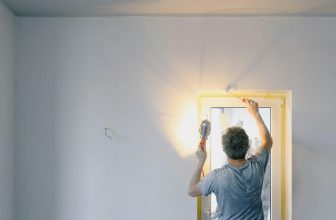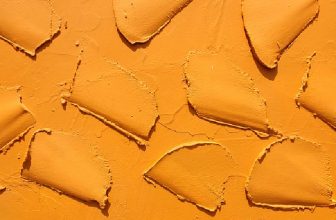How to Soundproof a Wall From Noisy Neighbours
Do you have loud neighbours that drive you up the wall? Does the sound of their conversation, music, and parties keep you from having a good night’s sleep? Don’t worry because with the right materials and tools, it is possible to soundproof your walls without draining your bank account. Read on to learn exactly how to soundproof a wall from noisy neighbours, including tips on what materials work best for maximum noise absorption.
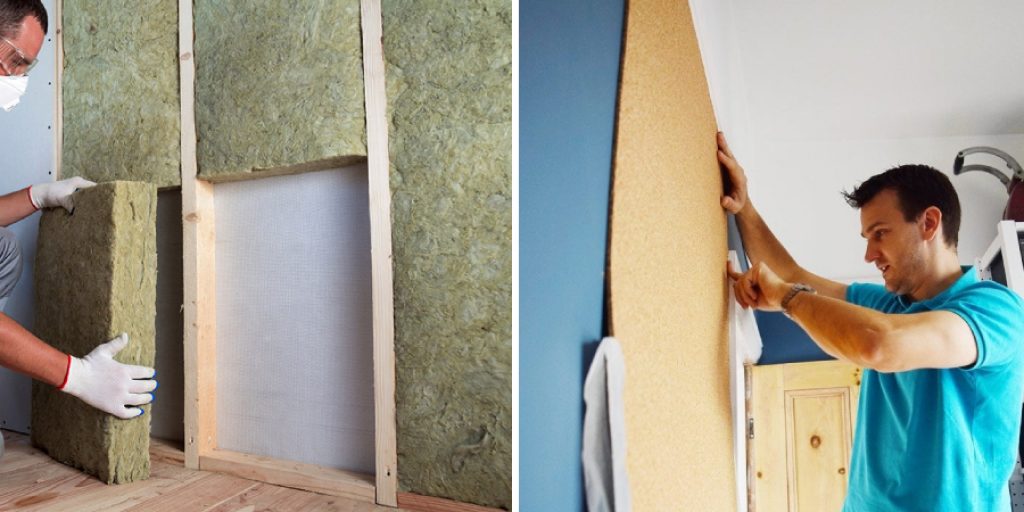
If you live in a noisy neighborhood and are looking for an effective way to soundproof a wall, then you’ve come to the right place! Noisy neighbors can be an incredibly frustrating issue that can disrupt your day-to-day life, but luckily there are many ways that you can try to reduce noise coming from the other side of the wall.
In this blog post we will explore various strategies to soundproof your walls so that you get some much-needed peace and quiet in your home. Let’s begin by taking a look at why it is important to invest time in making sure all of your walls are properly soundproofed, as well as exploring some helpful advice on what materials work best for each type of project.
Why May You Want to Soundproof a Wall From Noisy Neighbours?
1. To Reduce the Amount of Noise
One of the main reasons to soundproof a wall from noisy neighbors is to reduce the amount of noise that comes into your home. Noise pollution can be incredibly disruptive and frustrating, making it difficult for you to concentrate, relax and get a good night’s sleep. Soundproofing your walls can help decrease the level of noise coming from outside, helping create a quieter environment in your home.
2. To Protect Your Privacy
Noisy neighbors can make it difficult to have a private conversation within your home, as their noise can be easily heard through the walls. Soundproofing the walls of your home will help protect your privacy by blocking external noises from entering, making it easier for you to talk freely without worrying about anyone outside overhearing.
3. To Improve Your Home’s Acoustics
Soundproofing your walls can also help improve the acoustics of your home, making it easier to listen to music or watch movies without being distracted by external noise. This is especially helpful if you enjoy listening to loud music, as soundproofing your walls can help prevent it from disturbing your neighbors.
4. To Increase the Value of Your Home
Finally, soundproofing your walls can also be an excellent way to increase the value of your home. Not only does it make for a quieter environment in the home, but it can also make it more attractive to potential buyers. A home with soundproof walls is much more desirable than one without, and potential buyers are likely to be willing to pay more for the added value that comes with it.
Overall, soundproofing a wall from noisy neighbors can provide many advantages, such as reducing noise levels, protecting your privacy, improving acoustics and increasing the overall value of your home. It’s definitely worth considering if you’re looking for a way to make your home more comfortable and quiet.
10 Tips On How to Soundproof a Wall From Noisy Neighbours
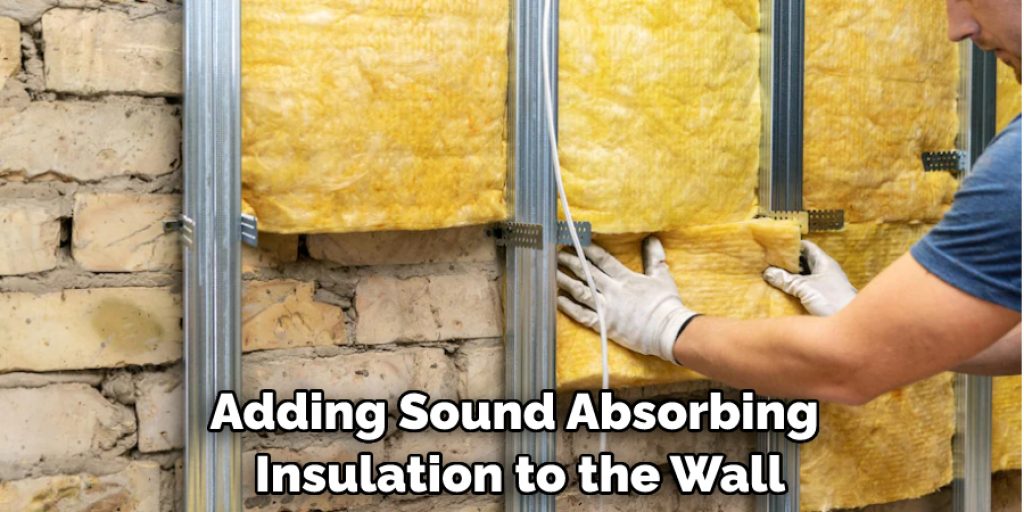
1. Use Sound-Absorbing Insulation
Adding sound-absorbing insulation to the wall can help reduce noise levels from your neighbors. Consider choosing insulation that is lightweight and easy to install, such as fiberglass batt insulation or spray foam insulation.
2. Install Acoustic Panels
Installing acoustic panels on walls near noisy neighbors can also help reduce the noise. Make sure to measure the size of the wall before purchasing panels and always use acoustic-grade materials for best results. Also, make sure to install the panels correctly for maximum effectiveness.
3. Hang Heavy Curtains or Drapes
Hanging heavy curtains or drapes on walls near noisy neighbors can help dampen sound as well. Make sure the fabric is thick enough and hung properly so that it covers the entire wall area. You may also want to consider using blackout curtains or drapes to block out noise from the outside.
4. Seal Any Cracks or Gaps in the Wall
Filling in any gaps or cracks in the wall can also help reduce sound. You can use a caulk gun and some acoustic sealant to fill these holes and make sure they are securely sealed off. This will keep sound from entering through any small openings in the walls.
5. Install an Acoustic Door
Installing an acoustic door can also help reduce noise levels from your noisy neighbors. Look for doors with multiple seals and gaskets to ensure that sound does not escape or enter through any gaps or cracks. These types of doors can be expensive, but they can provide great soundproofing benefits.
6. Hang Acoustic Foam on the Wall
Hanging acoustic foam on walls near noisy neighbors can help reduce noise levels as well. The foam will absorb sound waves and prevent them from entering the room, which in turn helps keep your living space quieter. Make sure to choose a type of foam that is tested for sound absorption and always follow the manufacturer’s instructions for installation.
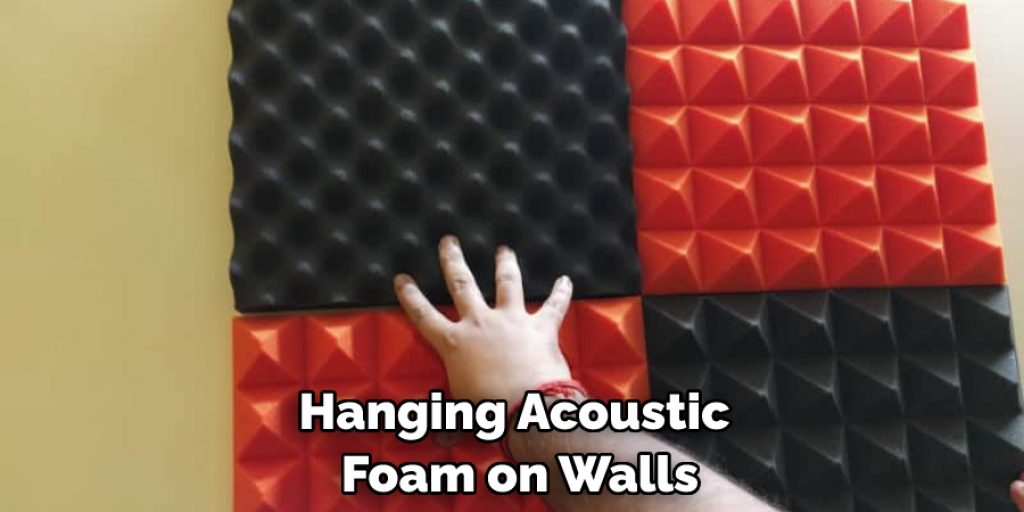
7. Add an Acoustic Flooring Underlayment
Installing an acoustic flooring underlayment can also help reduce noise from your neighbors. This type of material is designed to absorb sound waves before they reach the room, which will make it easier to keep your living space quiet. Make sure to measure the area before purchasing and always follow the manufacturer’s instructions for installation.
8. Use a Door Sweep or Threshold Gap Sealer
A door sweep or threshold gap sealer may also help reduce noise levels from noisy neighbors. These products are designed to block out a sound that might otherwise escape through gaps or cracks near the door. Make sure to measure the area before purchasing so you get the right size for your needs.
9. Install Soundproofing Drywall
Installing soundproofing drywall can also help reduce noise levels from your neighbors. This type of wallboard is designed to absorb sound waves entering the room, making it easier to keep your living space quiet. Make sure to measure the area before purchasing and always follow the manufacturer’s instructions for installation.
10. Consider Soundproof Windows
Finally, consider investing in soundproof windows if you want to dramatically reduce noise from your neighbors. These types of windows are designed with multiple seals and gaskets to block out sound from outside. They can be expensive, but they will provide great soundproofing benefits in the long run.
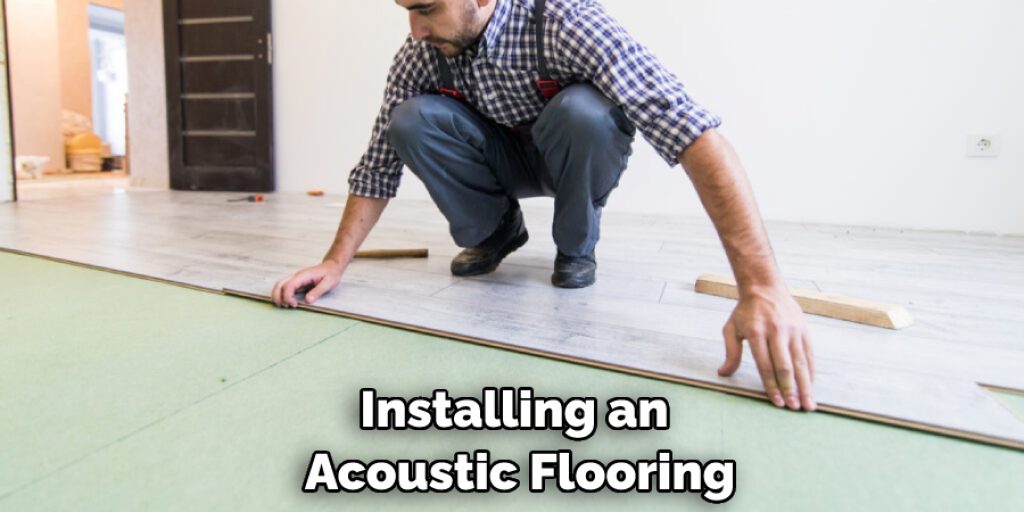
By following these steps, you should be able to reduce noise levels from your noisy neighbors and keep your living space more peaceful. Be sure to take all necessary precautions when attempting any of these projects yourself and always consider hiring a professional if you are unsure. With the right materials and installation techniques, soundproofing your walls from noisy neighbors can be both effective and affordable. Good luck!
Frequently Asked Questions
What Precautions Should I Take When Soundproofing a Wall?
When soundproofing a wall, the most important precaution to take is ensuring that air gaps are filled in and sealed. This will create a solid barrier between yourself and your noisy neighbors, allowing sound waves to be absorbed and stopped from entering your space.
Additionally, you should use materials like drywall or heavy insulation boards to build an additional layer of protection inside the walls. If you plan on doing any major soundproofing projects, it’s best to consult a professional to ensure that everything is done correctly and safely.

What Materials are Best for Soundproofing?
The most common materials used for soundproofing a wall are drywall, insulation boards, acoustic foam panels, and mass-loaded vinyl. Each of these materials has unique properties that make it great for soundproofing, such as absorption and diffusion of sound waves. Drywall is the most popular choice because it’s easy to install and fairly affordable, but if you want more serious soundproofing options then acoustic foam or mass-loaded vinyl are better choices.
What is the Best Way to Install Soundproofing Materials?
The best way to install soundproofing materials is to fill in all air gaps and ensure that everything is securely attached. It’s important to make sure that there are no cracks or crevices between the material and the wall, as this could create a gap for sound waves to enter your space. Additionally, you should use screws instead of nails to securely attach the soundproofing material, as this will create a more stable and secure structure.
Conclusion
Finding peace and quiet in a noisy neighbourhood can be difficult, but it is certainly achievable. With the right materials and proper technique, you can soundproof your walls and significantly reduce the noise coming from your neighbours. Invest in foam insulation sheets, build studio-style acoustic panels on your wall, fit them with soundproof furniture absorbers, as well as seal gaps between doors and windows for maximum effectiveness.
Now you know how to soundproof a wall from noisy neighbours! With some patience and effort this weekend, you will enjoy much more peaceful moments in the comfort of your own home. Enjoying some quiet time without any external noise interference by creating the perfect soundproof environment – what could be better?


